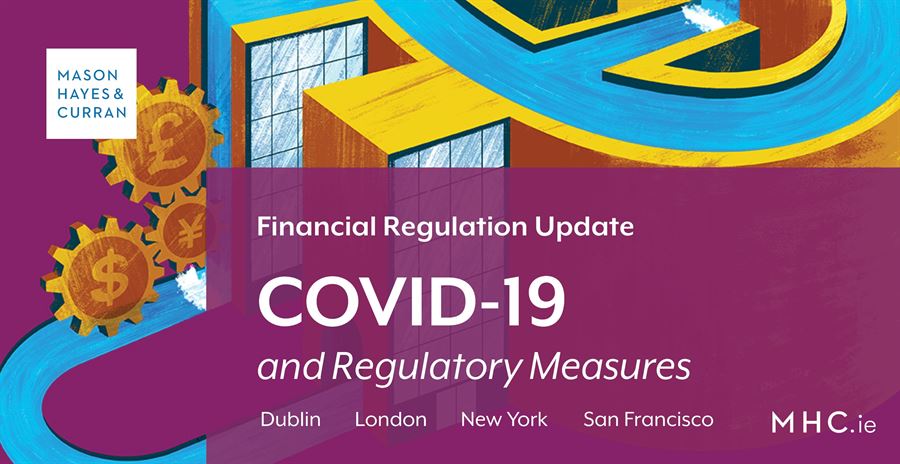
One of the prime functions of the Central Bank of Ireland (the Central Bank) is to safeguard monetary and financial stability and ensure the financial system operates in the best interests of the consumer and the wider economy. Recent European measures that the Central Bank has been involved with, such as the launch of a €750bn Pandemic Emergency Purchase Programme, temporary capital and operational relief to banks across the Eurozone, and the release the Counter Cyclical Capital Buffer (CCyB) from 1% to 0% are intended to do this.
The expectations of the Central Bank
In order to ensure that the benefit of these measures is passed on to households and businesses, the Central Bank met with the Banking & Payments Federation Ireland (BPFI) and five retail banks. Following this meeting, the Central Bank published a press release stating that it expects regulated firms, including banks, retail credit and credit servicing firms to focus on the best interests of consumers with financial difficulties during the pandemic. It also noted that there is no impediment to lenders introducing a three-month moratoria on mortgages, personal loans and business loans for those affected by COVID-19.
The Central Bank has launched a COVID-19 hub to provide information, guidance and policy decisions for consumers, businesses and regulated firms both from the Central Bank and other European authorities.
Further detail on impact of COVID-19 on the banking sector can be found here here
The European Central Bank
The European Central Bank (ECB) has taken decisive action to help banks in supporting the economies of Member States. Further actions will be taken by the ECB based upon emerging developments and their implications for the banking sector.
Non-performing loans
The ECB, Central Bank of Ireland and Minister for Finance have each discussed the importance of the treatment of non-performing loans (NPLs). The ECB introduced supervisory flexibility regarding the treatment of NPLs. It provides flexibility in the classification of debtors “unlikely to pay” and loans subject to COVID-19 related moratoria.
The ECB has also sanctioned flexibility during the implementation of NPL reduction strategies with banks, taking into consideration current market conditions. This was welcomed by the Minister for Finance, Pascal Donohoe who stated that this forbearance is an important consideration prior to loans being classified as non-performing.
The European Banking Authority
The European Banking Authority (EBA) released a statement on 25 March 2020 calling for the following:
-
Flexibility and pragmatism in the application of the prudential framework by regulators
The prudential framework requires banks to control risks and hold adequate capital as defined by capital requirements, liquidity requirements, by the imposition of concentration risk (or large exposures) limits, and by related reporting and public disclosure requirements. The EBA is allowing flexibility to assist banks with the implications of COVID-19 -
Consumer protection should remain a priority
The EBA requires full disclosure and transparency with customers -
Adequate risk measurements should be adopted
The EBA advised banks to ensure they maintain a sound identification method for credit impaired assets on bank balance sheets. The consistency and comparability in risk metrics by banks is crucial to monitor the effects of the current crisis on banks -
Individual assessments of all obligors’ likeliness to pay when possible
The EBA stated that loans can be renegotiated without classifying the exposure as being in default if the obligor remains likely to meet its obligations under the renegotiated contract. Similarly, it is the expectation of the EBA that individual assessments should be done in a careful manner without any ‘automatism’ in the classification of each loan -
Increase in contactless payments
The EBA also notes that well-functioning payment services are vital and contactless payments should be stepped up to the threshold allowed under EU law (up to €50). The Minister for Finance requested Irish banks increase the amount that can be spent in contactless payment transactions to €50 from €30 to minimise the handling of cash amid COVID-19. The increase took effect on 1 April as banks, retailers and technology companies worked closely to enable the majority of retailers to increase contactless payments to €50 by that date
EBA Guidelines on Moratoria
On 2 April 2020 the EBA published further guidance on the criteria to be fulfilled by legislative and non-legislative moratoria applied before 30 June 2020, the “Guidelines on treatment of public and private moratoria in light of COVID-19 measures”. The aim of these guidelines is to clarify that payment moratoria do not trigger classification as forbearance or distressed restructuring if the measures taken are based on applicable national law or an approach agreed between credit institutions. However, where borrowers may face longer-term financial difficulties, exposures should be classified in accordance with the existing regulation.
Comment
The central focus is clear; protect the interest of the consumers. As the pandemic evolves, regulated lenders are required to take responsive action to protect their business and employees’ health while ensuring core business continuity for customers in extremely stressed market conditions.
If you would like to discuss any of the points highlighted, please contact a member of the Financial Regulation team.
The content of this article is provided for information purposes only and does not constitute legal or other advice.






